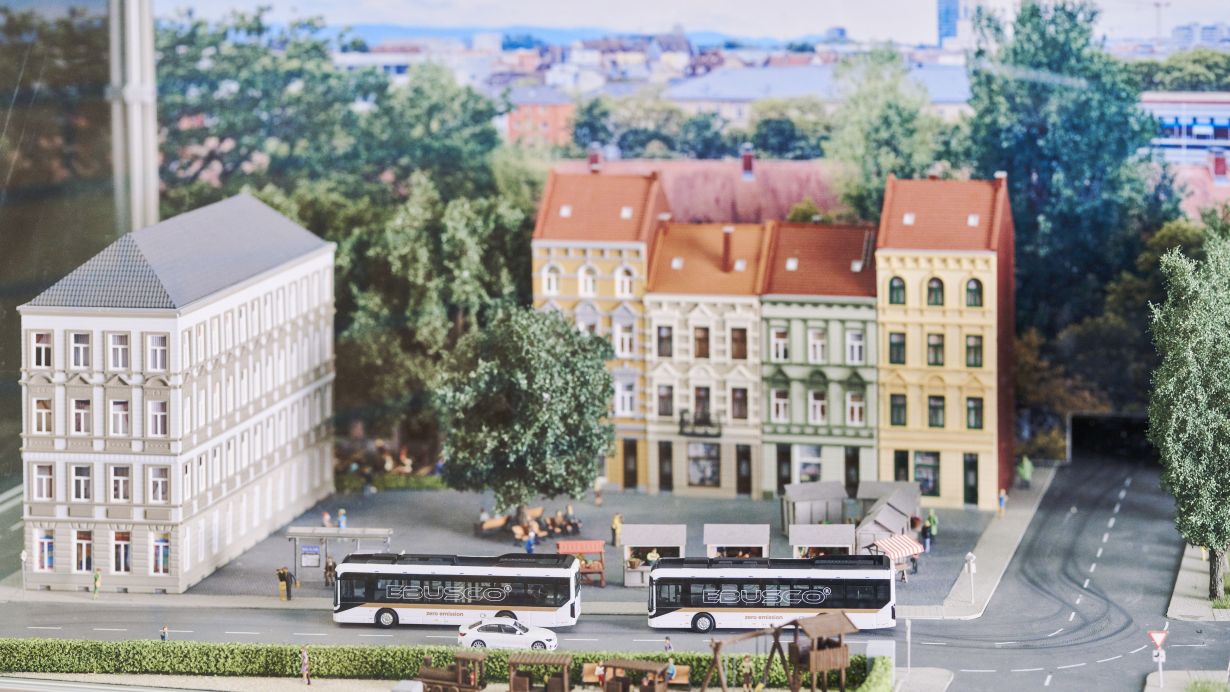Experts believe that automated driving makes particular sense in public transport – both ecologically and economically. The shortage of drivers, which has been lamented frequently, further reinforces this trend. Researchers at Karlsruhe Institute of Technology (KIT) are therefore developing – in cooperation with SWM, the Munich public utility company, and the vehicle manufacturer EBUSCO – electric buses for regular service in Munich that automatically follow a lead vehicle. The first prototypes of this concept, known as “platooning”, are already in operation.
The researchers will present their project at the Hannover Messe 2023 from April 17 to 21 – at the KIT booth in the Future Hub (Hall 2, Booth B45).
Digital press folder of KIT for the Hannover Messe
Video „Der Stadtbus der Zukunft fährt in Kolonne“ (The city bus of the future will drive in convoy) (in German)
“Conventional articulated buses or buses with passenger trailers require too much energy and cannot be used flexibly enough when it comes to responding to highly fluctuating passenger numbers,” says Professor Eric Sax, head of the Institute for Information Processing Technology (ITIV) at KIT. The solution is called “platooning”: Several vehicles, which are controlled electronically, follow each other at short distances. These platoons can be adapted as required to meet specific traffic needs. “With platooning, a driver is required for the lead vehicle only, with all others following automatically,” Eric Sax explains.
Cost-Effective and Efficient Electrification of Bus Transport
The units of the platoon are not connected physically, but via information technology. The “electronic tow bar” allows easy decoupling so that the bus platoons can be split and reconnected without further ado. “Platooning is an optimum way to adapt bus operation to the demand – depending on the time of day or route – especially in the urban hinterland,” says Nicole Kechler of ITIV. Besides flexibility, there are other benefits for urban bus operators: “One-size-fits-all buses and vehicle standards make the development, production, and operation of buses more efficient. Thus, the entire process of electrifying urban bus services becomes much less expensive. Moreover, automated steering, deceleration, and acceleration allow for a much easier implementation in electric vehicles than in their diesel counterparts,” Eric Sax adds.

can be connected or split up as needed. (ITIV, KIT)
Safety is Ensured by a Multitude of Sensors
The final goal is to replace all buses in Munich by electrically powered vehicles. Until then, there are still some technical challenges to be mastered: “For example, the distance between the buses must not be too great so that no other vehicles can slip in between. And the system must detect any pedestrians that step between the buses,” Eric Sax says. “We further have to consider the impact of ice, dust, and snow.” Safety is ensured by sensors: lidar, radar, and camera systems monitor distances and clearances. Vehicle data such as its position, steering angle, and speed are transmitted by radio to each following vehicle. “If, for example, the bus at front brakes, the following vehicle detects this action both by an airborne signal and by the brake lights flashing up.”
Researchers Aim to Put Bus Platoons on the Road by Mid-Decade
“We started out with creating the concepts for platooning city buses and then developed the corresponding algorithms for their automation,” says Nicole Kechler. These algorithms will then be used in a bus prototype realized by KIT researchers in cooperation with SWM and the Dutch electric bus manufacturer EBUSCO. It will be tested next year on the test field for electrified and autonomous vehicles in local public transport located in the north of the Bavarian capital. “Our goal is to have the new vehicles running in normal operation on the road by the middle of the decade.”
The TEMPUS Project
The TEMPUS project (short for Munich test field – urban autonomous road traffic pilot experiment) with the project partners KIT, SWM, and EBUSCO, among others, started at the beginning of 2021 and is funded by the Federal Ministry of Transport and Digital Infrastructure (BMDV) with around EUR 12 million for the duration of two and a half years. The Mobility unit of the City of Munich is in charge of the project. For real-life testing of autonomous, connected vehicles in real traffic situations, the City of Munich and the Free State of Bavaria are building and operating an urban test field for autonomous and connected vehicles in the north of Munich.
Being “The Research University in the Helmholtz Association”, KIT creates and imparts knowledge for the society and the environment. It is the objective to make significant contributions to the global challenges in the fields of energy, mobility, and information. For this, about 10,000 employees cooperate in a broad range of disciplines in natural sciences, engineering sciences, economics, and the humanities and social sciences. KIT prepares its 22,800 students for responsible tasks in society, industry, and science by offering research-based study programs. Innovation efforts at KIT build a bridge between important scientific findings and their application for the benefit of society, economic prosperity, and the preservation of our natural basis of life. KIT is one of the German universities of excellence.


